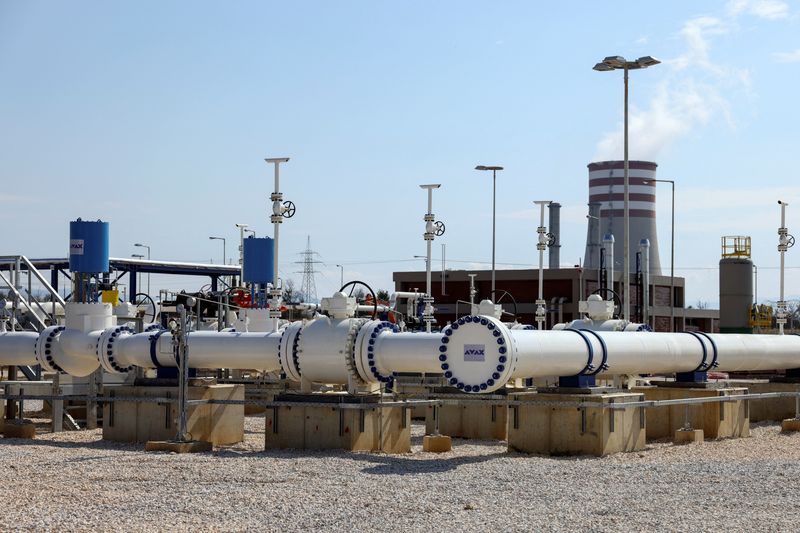By Nina Chestney
A global surge in wholesale power and gas prices means households across Europe face much higher energy bills this year and beyond, with the region's most vulnerable exposed to fuel poverty, consumer groups say.
WHY THE HIGH PRICES?
Energy companies pay a wholesale price to buy the gas and electricity they sell to consumers. As in any market, this can go up or down, driven by supply and demand.
Typically, prices rise in response to higher demand for heating and lighting in winter, and fall in summer.
Prices started to rise above historically normal levels last September and have soared further following supply disruption linked to Russia's invasion of Ukraine that began on Feb. 24.
Just before the war started, the German government halted the Nord Stream 2 pipeline that would have doubled the amount of Russian gas shipped to Europe.
In July, Russia cut volumes pumped through Nord Stream 1 to 20% of capacity https://www.reuters.com/business/energy/russia-says-it-has-little-ability-help-with-nord-stream-1-repair-2022-08-01, citing maintenance issues, in what the German government said was a pretext used by Moscow to hit back against Western sanctions.
On Friday, Russia has scrapped a Saturday deadline to resume flows via Nord Stream 1 to Germany, deepening Europe's difficulties in securing winter fuel, after saying it had found faults in the pipeline during maintenance.
Nord Stream 1, which runs under the Baltic Sea, had been due to resume operating after a three-day halt for maintenance.
French nuclear outages and a heatwave across Europe this summer have also boosted demand.
Benchmark European gas prices at the Dutch TTF hub have risen by nearly 350% year on year, while German and French front-year power contracts have leapt by 540% and 790% respectively.
HOW LONG COULD THIS LAST?
Many gas market analysts expect prices to remain elevated for the next two years or more.
Global competition for gas and coal this winter is expected to prevent prices from falling. Any more disruption to Russian gas supply, such as a full stoppage through Nord Stream 1, would support prices.
Although European countries are on track to refill gas storage sites to a minimum level of 80% by Oct. 1, an extra cold winter could deplete those reserves quickly.
WHY RETAIL PRICE RISES?
Many energy suppliers pass on higher wholesale costs to consumers through their retail tariffs. In Britain, for example, on a dual fuel bill (electricity and gas), the wholesale cost can account for 40% of the total.
Suppliers can buy energy on the wholesale market on the day of delivery, a day ahead and up to months or seasons in advance, as they try to predict when prices will be lower and how much to purchase to cover their customer needs.
If suppliers do not buy enough energy, they might have to buy more at a price that could be higher, depending on market movements.
GOVERNMENT ACTION
The European Union in July asked its member states to reduce gas demand voluntarily https://www.reuters.com/business/energy/bracing-russian-gas-cuts-eu-readies-plan-cut-demand-2022-07-20 by 15% this winter with the possible introduction of mandatory cuts.
Several European governments had already taken measures to drive consumption down before the announcement, such as laws on air conditioning and heating levels in public and commercial buildings.
Germany has moved to the second stage of a three-tier emergency gas plan. The third stage envisages supply being curtailed to industry.
It will also introduce a gas levy to distribute the high costs of replacing Russian gas among all end-consumers from October but this could see German energy bills rise by another 480 euros https://www.reuters.com/article/ukraine-crisis-germany-gas/update-1-german-energy-bills-to-rise-by-another-480-euros-a-year-under-gas-levy-idINL8N2ZR25M ($489.46) a year.
Governments have also announced measures such as subsidies, removing environmental levies or VAT from bills and price caps.
Britain, which relies heavily on gas for heating, introduced a price cap on the most widely-used energy tariffs in 2019 that sets a maximum charge per unit of energy and limits suppliers' profits to 1.9%.
However, the cap is estimated to rise to over 4,200 pounds https://www.reuters.com/world/uk/uk-energy-price-cap-seen-rising-above-4200-pounds-jan-analysts-2022-08-09/#:~:text=LONDON%20(Reuters)%20-%20Britain's%20cap,set%2C%20analysts%20said%20on%20Tuesday($5,075.28) a year in January, up 230% on the year before.
WHAT CAN CONSUMERS DO?
Households account for 30%-40% of Europe's gas demand. Some 80% of household gas demand is from heating while the rest is from hot water and cooking.
Usually demand is higher in the winter gas season, which runs from October to March.
According to Bernstein analysts, certain measures by households could reduce household gas demand by a third.
Turning a thermostat down by 1 degree to 19 degrees Celsius from 20C could reduce household gas demand by around 7%. Lowering the temperature by another one degree could reduce household gas demand by a further 7%.
Wearing a thick jumper at home during the winter season could deliver another 4% saving in household demand.
Delaying putting on the heating to November from October and/or stopping heating by February rather than March could save 3%-6%. Turning radiators off in unused rooms, replacing shower heads with water efficient ones and only using boilers twice a day could save a further 7% of demand.
In Britain, the "Don't Pay UK" campaign is calling for a reduction in energy bills to an affordable level and urges people to cancel their direct debit energy payments from October.

($1 = 0.9807 euros)
($1 = 0.8275 pounds)